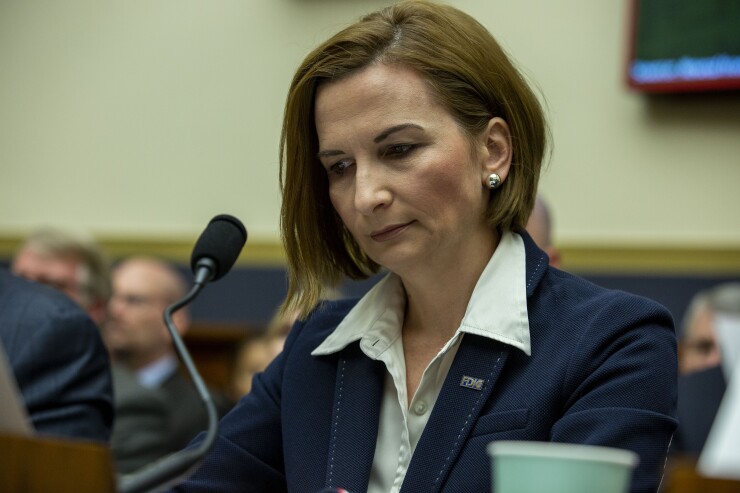WASHINGTON — Banks notched a clear victory this past week when regulators approved a
In addition to the steps already taken, the regulators said they would address the “covered funds” portion in an upcoming proposal. The original 2013 rule, the idea of which was first conceived by former Federal Reserve Chairman Paul Volcker, not only banned proprietary trading but also limited bank stakes in private equity and hedge funds to prevent the type of short-term risky bets that helped precipitate the financial crisis.
Banks have long argued that the provision restricting funds is too broad and confusing, unnecessarily capturing investment activities that lawmakers did not intend to prohibit in the 2010 law, like venture capital funds or family wealth management vehicles.
“The covered funds side of the rule didn’t entirely make sense because … it doesn’t matter what the fund does,” said Joseph Vitale, a partner at Schulte Roth & Zabel. “It doesn’t matter whether the fund is engaging in prop trading or long term investments. … The fund is covered by the rule and investments in that fund are largely prohibited.”

When first proposing a revamp of the Volcker Rule in May 2018, the five regulatory agencies suggested making high-level changes to the covered funds section, including expanding exemptions for underwriting, market-making and risk-mitigating hedging activities, as well as exempting prime brokerage transactions. Those changes were all adopted as proposed when the Federal Deposit Insurance Corp. and Office of the Comptroller of the Currency approved them on Aug. 20. (The other three agencies are expected to sign off shortly.)
But at the FDIC board meeting, officials said the agency
“Additional fine-tuning is necessary on the restrictions associated with covered funds, and we plan to make such changes through a future rulemaking,” said FDIC Chairman Jelena McWilliams.
Following the May 2018 proposal, public commenters urged the agencies to clarify the provision.
“The way I read the FDIC final rule that came out … was they heard all this noise around covered funds and I think what they’re going to try to do is be a little bit more prescriptive around what they really mean by covered funds and what should be covered versus what shouldn’t be covered,” said Joseph Sergienko, director and head of the qualitative analytics practice at Navigant.
The banking industry is not alone in expressing dissatisfaction with the current covered funds definition. In October, seven Republicans on the Senate Banking Committee
Federal Reserve Vice Chair for Supervision Randal Quarles also
Many banks seem to wholeheartedly agree, arguing that a clarification would not only help their business, but also the customers they serve.
“Certainly it would be helpful for the banking industry, and it'd be helpful for regulators as well so that they would be able to sharpen the regulation and they would be able to be given the certainty to understand what is and what is not a covered fund,” said Timothy Keehan, vice president and senior counsel at the American Bankers Association. “We're really looking for a win-win-win situation here, not just the industry but also for regulators and especially customers.”
The industry is hopeful that the venture capital funds in particular will be a target that the regulators focus on when formulating their proposal. Former Sen. Chris Dodd, D-Conn., a principal author of Dodd-Frank, said himself in 2010 that “properly conducted venture capital investment will not cause the harms at which the Volcker Rule is directed.”
“Under the current iteration, venture capital funds are somehow swept into covered funds, and so that's where we want to see the agencies focus their reform efforts on this so that the funds that are excluded are the ones that are actually supposed to be excluded,” said Keehan.
A re-proposal of the covered funds definition would give the agencies an opportunity to refine elements that may have been overlooked when they first implemented the Volcker Rule in 2013, agreed Sergienko.
“They’re really going to take a fine-tooth comb to the comments and try to get more granular in their definition of what should be covered and what shouldn’t be covered,” he said.
The end result of that could resemble a matrix, Sergienko said, that would outline certain scenarios in which an asset is considered a covered fund.
Keehan said he believes the best approach would be to revise the covered funds definition “to focus on those funds that are engaged primarily in short-term prop trading, because that’s the restriction that the Volcker Rule is trying to cover."
Alternatively, the agencies could propose adding new exclusions, such as venture capital funds. That exclusion in particular could provide more economic opportunity to small businesses and consumers, said Keehan.
“Think about all the different businesses that come to banks for venture capital funds,” he said. “If banks cannot give to these small startups, then they lose an important source of funding.”
In 2017, the Treasury Department issued a report on restructuring elements of the financial industry in a way to foster economic opportunity that also suggested venture capital funds be excluded from the covered funds provision of the Volcker Rule.
“Treasury believes that changes to the covered fund provisions can greatly assist in the formation of venture and other capital that is critical to fund economic growth opportunities,” the report said, also noting that the original Volcker Rule “was not well-tailored” to meet its objectives.
Sergienko cautioned that easing the covered funds provision could encourage institutions to take greater risk.
“But as long as there’s containment on that risk and it’s not the bank’s risk, I can’t necessarily get too hung up on it,” he said.





